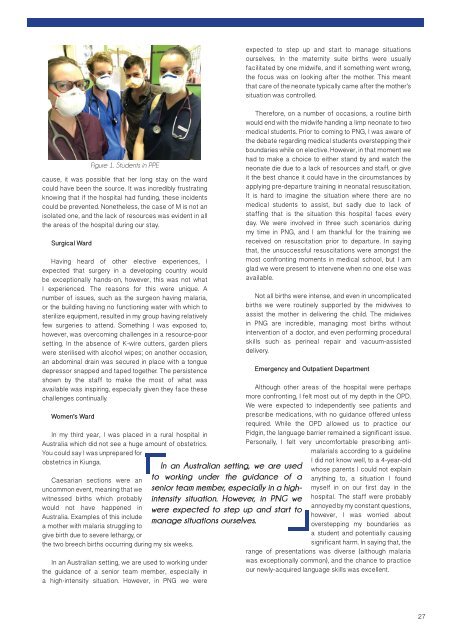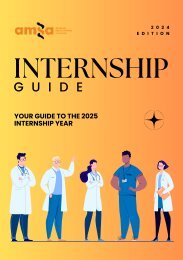Vector Volume 11 Issue 2 - 2017
Create successful ePaper yourself
Turn your PDF publications into a flip-book with our unique Google optimized e-Paper software.
cause, it was possible that her long stay on the ward<br />
could have been the source. It was incredibly frustrating<br />
knowing that if the hospital had funding, these incidents<br />
could be prevented. Nonetheless, the case of M is not an<br />
isolated one, and the lack of resources was evident in all<br />
the areas of the hospital during our stay.<br />
Surgical Ward<br />
Having heard of other elective experiences, I<br />
expected that surgery in a developing country would<br />
be exceptionally hands-on, however, this was not what<br />
I experienced. The reasons for this were unique. A<br />
number of issues, such as the surgeon having malaria,<br />
or the building having no functioning water with which to<br />
sterilize equipment, resulted in my group having relatively<br />
few surgeries to attend. Something I was exposed to,<br />
however, was overcoming challenges in a resource-poor<br />
setting. In the absence of K-wire cutters, garden pliers<br />
were sterilised with alcohol wipes; on another occasion,<br />
an abdominal drain was secured in place with a tongue<br />
depressor snapped and taped together. The persistence<br />
shown by the staff to make the most of what was<br />
available was inspiring, especially given they face these<br />
challenges continually.<br />
Women’s Ward<br />
Figure 1. Students in PPE<br />
In my third year, I was placed in a rural hospital in<br />
Australia which did not see a huge amount of obstetrics.<br />
You could say I was unprepared for<br />
obstetrics in Kiunga.<br />
Caesarian sections were an<br />
uncommon event, meaning that we<br />
witnessed births which probably<br />
would not have happened in<br />
Australia. Examples of this include<br />
a mother with malaria struggling to<br />
give birth due to severe lethargy, or<br />
the two breech births occurring during my six weeks.<br />
In an Australian setting, we are used to working under<br />
the guidance of a senior team member, especially in<br />
a high-intensity situation. However, in PNG we were<br />
In an Australian setting, we are used<br />
to working under the guidance of a<br />
senior team member, especially in a highintensity<br />
situation. However, in PNG we<br />
were expected to step up and start to<br />
manage situations ourselves.<br />
expected to step up and start to manage situations<br />
ourselves. In the maternity suite births were usually<br />
facilitated by one midwife, and if something went wrong,<br />
the focus was on looking after the mother. This meant<br />
that care of the neonate typically came after the mother’s<br />
situation was controlled.<br />
Therefore, on a number of occasions, a routine birth<br />
would end with the midwife handing a limp neonate to two<br />
medical students. Prior to coming to PNG, I was aware of<br />
the debate regarding medical students overstepping their<br />
boundaries while on elective. However, in that moment we<br />
had to make a choice to either stand by and watch the<br />
neonate die due to a lack of resources and staff, or give<br />
it the best chance it could have in the circumstances by<br />
applying pre-departure training in neonatal resuscitation.<br />
It is hard to imagine the situation where there are no<br />
medical students to assist, but sadly due to lack of<br />
staffing that is the situation this hospital faces every<br />
day. We were involved in three such scenarios during<br />
my time in PNG, and I am thankful for the training we<br />
received on resuscitation prior to departure. In saying<br />
that, the unsuccessful resuscitations were amongst the<br />
most confronting moments in medical school, but I am<br />
glad we were present to intervene when no one else was<br />
available.<br />
Not all births were intense, and even in uncomplicated<br />
births we were routinely supported by the midwives to<br />
assist the mother in delivering the child. The midwives<br />
in PNG are incredible, managing most births without<br />
intervention of a doctor, and even performing procedural<br />
skills such as perineal repair and vacuum-assisted<br />
delivery.<br />
Emergency and Outpatient Department<br />
Although other areas of the hospital were perhaps<br />
more confronting, I felt most out of my depth in the OPD.<br />
We were expected to independently see patients and<br />
prescribe medications, with no guidance offered unless<br />
required. While the OPD allowed us to practice our<br />
Pidgin, the language barrier remained a significant issue.<br />
Personally, I felt very uncomfortable prescribing antimalarials<br />
according to a guideline<br />
I did not know well, to a 4-year-old<br />
whose parents I could not explain<br />
anything to, a situation I found<br />
myself in on our first day in the<br />
hospital. The staff were probably<br />
annoyed by my constant questions,<br />
however, I was worried about<br />
overstepping my boundaries as<br />
a student and potentially causing<br />
significant harm. In saying that, the<br />
range of presentations was diverse (although malaria<br />
was exceptionally common), and the chance to practice<br />
our newly-acquired language skills was excellent.<br />
27

















